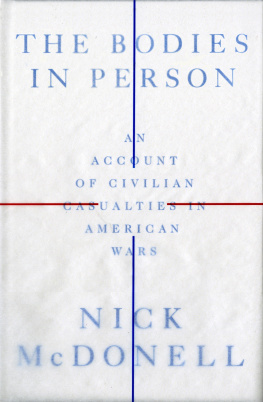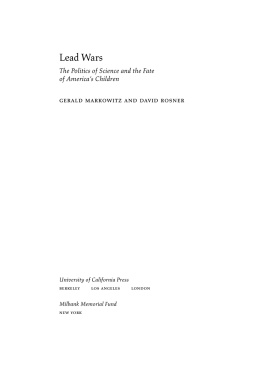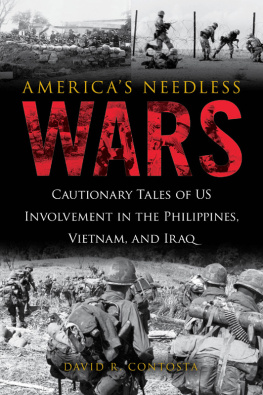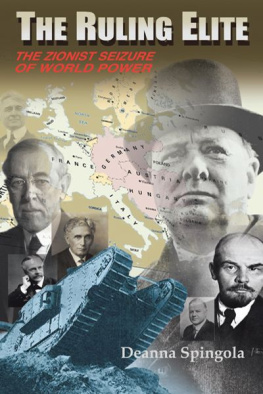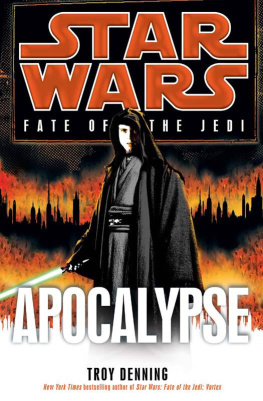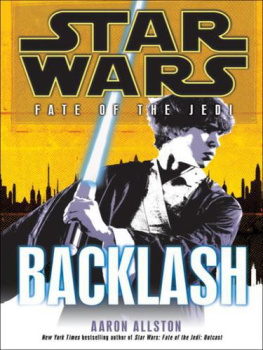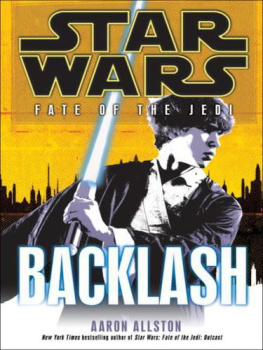Tirman - The deaths of others: the fate of civilians in Americas wars
Here you can read online Tirman - The deaths of others: the fate of civilians in Americas wars full text of the book (entire story) in english for free. Download pdf and epub, get meaning, cover and reviews about this ebook. City: USA;New York;NY;United States;Verenigde Staten, year: 2015;2011, publisher: Oxford University Press, genre: Politics. Description of the work, (preface) as well as reviews are available. Best literature library LitArk.com created for fans of good reading and offers a wide selection of genres:
Romance novel
Science fiction
Adventure
Detective
Science
History
Home and family
Prose
Art
Politics
Computer
Non-fiction
Religion
Business
Children
Humor
Choose a favorite category and find really read worthwhile books. Enjoy immersion in the world of imagination, feel the emotions of the characters or learn something new for yourself, make an fascinating discovery.

The deaths of others: the fate of civilians in Americas wars: summary, description and annotation
We offer to read an annotation, description, summary or preface (depends on what the author of the book "The deaths of others: the fate of civilians in Americas wars" wrote himself). If you haven't found the necessary information about the book — write in the comments, we will try to find it.
Tirman: author's other books
Who wrote The deaths of others: the fate of civilians in Americas wars? Find out the surname, the name of the author of the book and a list of all author's works by series.
The deaths of others: the fate of civilians in Americas wars — read online for free the complete book (whole text) full work
Below is the text of the book, divided by pages. System saving the place of the last page read, allows you to conveniently read the book "The deaths of others: the fate of civilians in Americas wars" online for free, without having to search again every time where you left off. Put a bookmark, and you can go to the page where you finished reading at any time.
Font size:
Interval:
Bookmark:
The Deaths of Others
The Fate of Civilians in Americas Wars
John Tirman


Oxford University Press, Inc., publishes works that further
Oxford Universitys objective of excellence
in research, scholarship, and education.
Oxford New York
Auckland Cape Town Dar es Salaam Hong Kong Karachi
Kuala Lumpur Madrid Melbourne Mexico City Nairobi
New Delhi Shanghai Taipei Toronto
With offices in
Argentina Austria Brazil Chile Czech Republic France Greece
Guatemala Hungary Italy Japan Poland Portugal Singapore
South Korea Switzerland Thailand Turkey Ukraine Vietnam
Copyright 2011 by John Tirman
Published by Oxford University Press, Inc.
198 Madison Avenue, New York, NY 10016
www.oup.com
Oxford is a registered trademark of Oxford University Press
All rights reserved. No part of this publication may be reproduced,
stored in a retrieval system, or transmitted, in any form or by any means,
electronic, mechanical, photocopying, recording, or otherwise,
without the prior permission of Oxford University Press.
Library of Congress Cataloging-in-Publication Data
Tirman, John.
The deaths of others : the fate of civilians in Americas wars / John Tirman.
p. cm.
Includes bibliographical references.
ISBN 978-0-19-538121-4 (hbk. : acid-free paper) 1. United StatesHistory, Military20th century.
2. United StatesHistory, Military21st century. 3. United StatesMilitary policy.
4. Civilians in war. 5. Battle casualties. 6. War and societyUnited States.
7. MilitarismUnited States. 8. United StatesForeign public opinion. I. Title.
E840.4.T57 2011
355.00973dc22 2010046707
1 3 5 7 9 8 6 4 2
Printed in the United States of America
on acid-free paper
For Coco
The Deaths of Others
Introduction
A friend and I were walking across the National Mall in Washington, D.C., one day in the spring of 2009 and happened upon the Korean War Memorial, which I had never seen closely. It commemorates the Americans who died protecting South Korea from an invasion by North Korea; some three million people died in the three-year war, more than 30,000 of them U.S. soldiers. The memorial was striking in design, with its platoon of bronze-cast soldiers, frozen in time, making its way through the mud and cold, and the eerie photographic images on an adjacent marble wall. But one thing was missingany mention of the Korean people. Even the South Korean forces were lumped together with all the countries that served under the UN command. We then ventured across to the Vietnam War Memorial, which I had visited before and which had always struck me powerfully, probably because the 58,000 names of the dead on the Wall were men and women of my generation. But I noticed that here, too, there was no reference to the people these memorialized men and women were there to protect. It was as if, in these two conflagrations, only the Americans could be cited, only their deaths mattered: not even the place or the call-to-arms merited more than a glancing note.
One of the most remarkable aspects of American wars is how little we discuss the victims who are not Americans. The costs of war to the populations and common soldiers of the enemy are rarely found in the narratives and dissections of conflict, and this habit is a durable feature of how we remember war. As a nation that has long thought of itself as built on Christian ethics, even as an exceptionally compassionate people, this coldness is a puzzle. It is in fact more than a puzzle, for ignorance or indifference has consequences for the victims of American wars and for America itself.
Wars can kill a great many people, and innocent people, which everyone knows but few consider more closely; it seems to be a regrettable but unavoidable fact of armed conflict. Throughout the twentieth century, it was apparent that war was killing by direct violence more and more civilians as a share of total deaths, flipping the one-to-nine ratio of civilian-to-soldier mortality in the First World War to nine-toone in many of the ethnic conflicts that occurred after the Cold War ended. Whether this startling reversal of fortune is exactly correct is less important than the underlying reality of breathtaking civilian tolls. In that same, gruesome century, only gradual fluctuations in attitudes about war and its human cost were discernible. The horror of the carnage of the Great War in Europe probably had the most lasting impact, deflating the glorification of war that held sway for so many centuries.
Since then, however, a bleak sensibility of wars necessity has persisted, chiefly in the United States, which mostly has been spared devastation since our Civil War and has regarded itself as safeguarding the free world against fascism, communism, and terrorism. We have altered the dynamics of death in wartimemore efficient killing, more civilians than soldiers dyingbut we have not altered how we think about the human consequences of war. Even the Cold War could sustain nuclear weapons of such power that the casualties in a full-out U.S.-Soviet war were estimated in the hundreds of millions, and this risk was thought acceptable by large numbers of Americans (so much so that the risk continues even though the conflict has vanished).
In the wars since the two-time use of nuclear weapons ended the Second World War in 1945, the U.S. military has been in three major wars: Korea, 195053; Vietnam, 196475; and Iraq, 1991present. Between one and three million people have died in each of those wars. Most of the dead were civilians. The Vietnam War and the invasion of Iraq in 2003 were of doubtful legality, making those high casualties all the more vexing. The U.S. military did not kill those six to seven million people alone. The adversariesNorth Korea and China, North Vietnam and the Viet Cong, the Saddam Hussein regime in Iraq and dozens of insurgent groupsdid plenty of killing, as did the armies we supported. There was a rationale attached to each American intervention, not always a compelling rationale, but one that was shaped by both a sense of national destiny and specific, perceived threats. These three wars were enormous conflicts, and with a couple of exceptionsthe Chinese Civil War, which took eight million lives, and the war in the Congo, which by some estimates has five million deadthe American wars are the largest since the Second World War. So we have had, as a people, ample opportunity to experience war, if remotely, and to debate the consequences of those wars that were, paradoxically, distinct expressions of the Pax Americana.
Each of these interventions was initially popular among the American people, but they ended in political failure and public disappointment. (While I explore the Iraq War as one venture from Operation Desert Storm to the present, declining public favor applies to the main phase beginning with the 2003 invasion.) The disintegration of support for war follows notably similar patterns in each instance. Rally-round-the-flag zeal soon crumbles as reports of setbacks on the battlefield and American casualties mount. Whether antiwar voices are prominent or muted seems not to affect the downward cycle of public distaste for the conflict. Nor does this growing aversion in each instance stem from concern about the bloodshed spilled by the populations in the war zone. Apart from yellow ribbons and occasional hero status accorded the American troops (a recent trend) the home front was indifferent to the human costs of war. The Vietnam War (itself a misnomer, as the United States carried the war into Cambodia and Laos) generated more aversion to these human costs by peace activists and the news media than did Korea or Iraq, but even then the war opposition mainly built its case on the growing numbers of U.S. casualties and the futility of their sacrifice.
Next pageFont size:
Interval:
Bookmark:
Similar books «The deaths of others: the fate of civilians in Americas wars»
Look at similar books to The deaths of others: the fate of civilians in Americas wars. We have selected literature similar in name and meaning in the hope of providing readers with more options to find new, interesting, not yet read works.
Discussion, reviews of the book The deaths of others: the fate of civilians in Americas wars and just readers' own opinions. Leave your comments, write what you think about the work, its meaning or the main characters. Specify what exactly you liked and what you didn't like, and why you think so.

